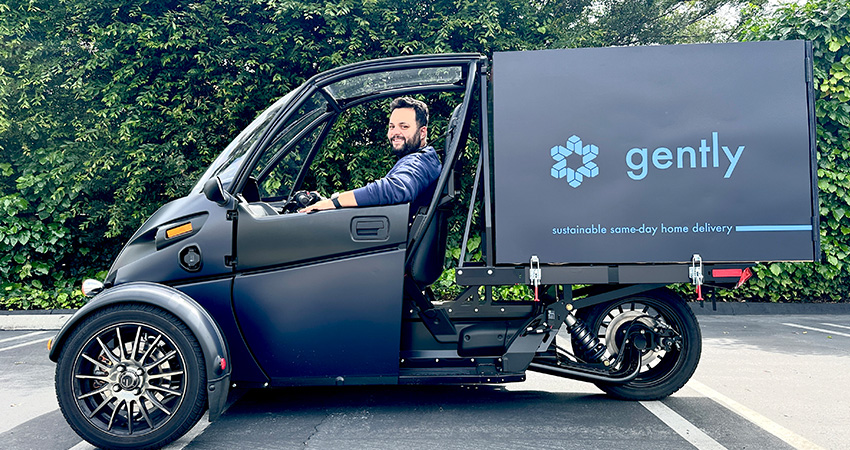Gently hopes to become a disrupter of urban fulfillment and major retailers with multi-billion-dollar networks, offering a same-day, nano fulfillment model using small nodes located around a city, tapping a predictive analytics engine to stock and position inventory in anticipation of demand.
The solution, which went live last month in Los Angeles with its first delivery, isn’t built for retailers with large SKU counts, at least initially. Gently is focusing for now on the low-hanging fruit of things like consumables and everyday essentials. But it does have ambitions to scale up to that level and expand to other metros if the model succeeds in LA.
The concept of creating sustainable last-mile delivery in urban environments is one being pursued by several other startups, including GoBolt, Ohi and others.
“The idea is to enable brands that make up 90% of the U.S. retail market to be as competitive as the big players,” said Gently cofounder Anas Aljumaily. “They built their businesses up over the last 50 years and today are left out of the space, not able to afford a massive investment in the supply chain. The idea is to decentralize and try to solve the problem without billions in capex by leveraging existing real estate.”
Aljumaily said the inspiration for Gently, as is often the case, arose from a bad customer experience. He ordered an $800 vase from a store in Beverly Hills, and was told at checkout it would arrive in three to five days, from a mile and a half away.
“I asked, can you deliver to my house?” he recalled. “An associate arrived seven or eight hours later. When I asked how he got there, he said he took a cab. They must’ve spent $80 to $90 to bring it to me. I thought, there’s no better way to do this?”
Gently’s uban fulfillment network consists of a warehouse in Santa Monica, CA, and two nano fulfillment hubs in Los Angeles. Inventory is shipped by retailers to Santa Monica, where it is deconsolidated and moved to a nano hub based on demand signals. Standardized racks are used both to transport goods from the FC and store them in the hubs.
The company uses its own fleet of electric Ford E-Transit vans for inter-modal transportation and pickup from retailers, which will switch to Brightdrop vehicles next month. Arcimoto EV flatbeds are used for end delivery. New nano hubs will be added soon in Marina del Rey and Palisades, CA.
Aljumaily cofounded Gently in 2022 along with Harvard Business School classmate Elian Pres-Gurwits. Its SVP of logistics, Frank Gambish, is a former regional manager for Amazon who launched 50+ new fulfillment centers. Headcount is at 20, and the company is looking to hire drivers and fill head of communications, business development manager and chief of staff roles.
Thus far, its urban fulfillment operations have been funded partly from the sale of OneFour, a software company Aljumaily started that uses technology similar to Gently: analyzing contextual data such as weather, time of day and year and other factors to help predict traffic accidents. It’s also funded by Meridian Media Ventures, an investment vehicle which owns a number of profitable businesses.
“We are constantly iterating our nano fulfillment center design, and we’re currently on version Pluto 1.2,” Aljumaily said, referring to the project’s codename. “The dimensions are 20 feet by 8.5 feet and the current capacity, which is always being improved, is 2,000 items of inventory and fulfillment of 800 orders per day.”
Part of that iteration is finding ways to limit delivery trips to customers and between nodes to optimize urban fulfillment. “We want to make sure inventory is placed correctly to shorten the last mile,” Aljumaily said.
Early Gently clients include Cloud Paper, a subscription sustainable paper goods company whose investors include Jeff Bezos, Gwynneth Paltrow and Ashton Kutcher, and Clear Beauty. Customer data shared by the brands helps drive Gently’s predictive modeling.
One option for retailers with physical stores: free rent for locating a node on their property in exchange for a slight discount on order fulfillment.
“We’re trying to nail the model and build out our LA operations,” Aljumaily said. “Once that’s done, we’ll add New York, Chicago and Dallas as soon as late 2024.”

